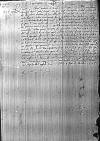List #241
Ioannes DANTISCUS do Piotr TOMICKIMadrid, 1525-04-09
Rękopiśmienne podstawy źródłowe:
Pomocnicze podstawy źródłowe:
Publikacje:
| ||||||||||||||||||||||
Tekst + aparat krytyczny + komentarz Zwykły tekst Tekst + komentarz Tekst + aparat krytyczny Ekscerpty dotyczące podróży Dantyszka
Reverendissimo in Christo patri et Domino, domino
Reverendissime in Christo Pater et Domine, Domine gratiosissime. Humillimam commendationem.
Scripsi iterum maiestati regiae ea, quae post novissimas meas cum domino de Bredom datas se hic obtulerunt, ex quibus Dominatio Vestra Reverendissima omnia intelleget. Hoc vero quod istius nuntium spectat, cum illi has deferendas dedi, non audebam ad unguem describere. Adhuc super T ea mihi est mens, quemadmodum prius scripsi.
Haec sunt, quae mihi hoc tempore videbantur scribenda, quae Dominatio Vestra Reverendissima pro mea fide et sua summa sapientia metiatur. Alia hac tempestate se non offerunt. Commendo me humiliter Dominationi Vestrae Reverendissimae, et per Deum immortalem rogo, mei in hoc exilio non obliviscatur.
Datae
ex
Reverendissimae Dominationis Vestrae humillimus servus

